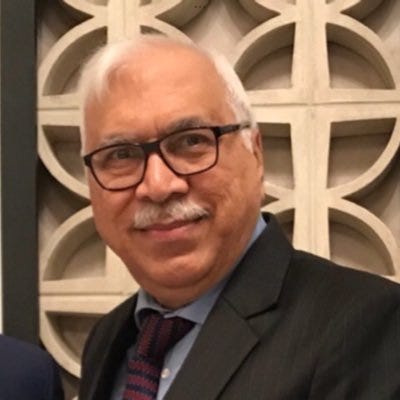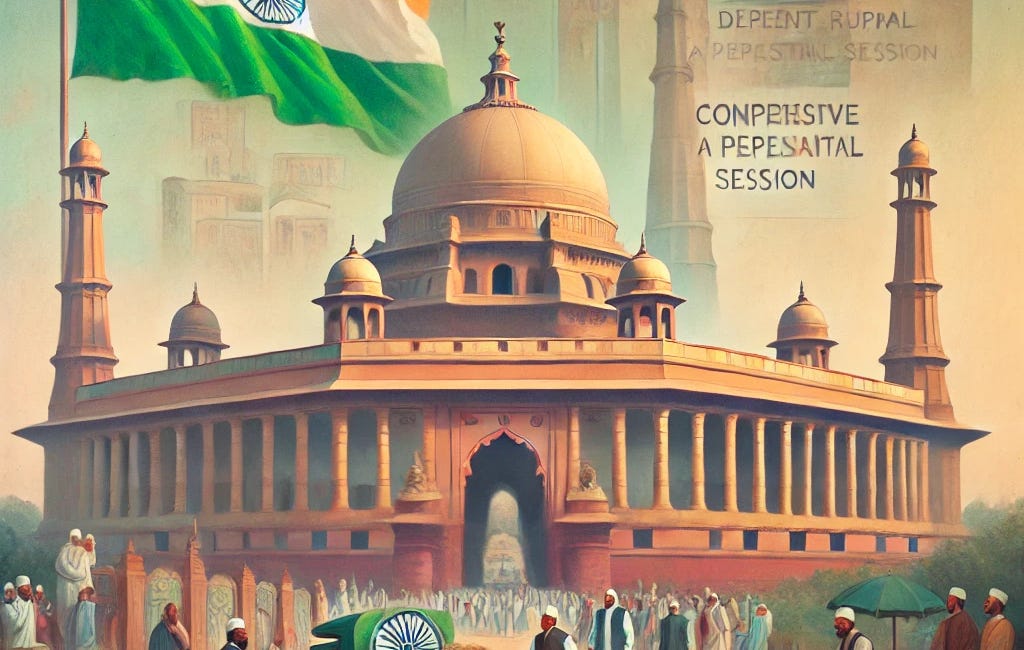Dr. Quraishi, Are You Aware of the Provisions of the Waqf Law?
Controversy Surrounding the Waqf (Amendment) Act: A Critical Examination of Rhetoric, Legal Challenges, and Institutional Accountability.
Dr. Quraishi, Are You Aware of the Waqf Law?
डॉ. कुरैशी, क्या आप वक़्फ़ क़ानून से वाक़िफ़ हैं?
ڈاکٹر قریشی، کیا آپ وقف کے قانون سے واقف ہیں؟
By Karan Bir Singh Sidhu
Retired IAS Officer, Former Financial Commissioner Revenue, Punjab
Controversy Surrounding the Waqf (Amendment) Act: A Dispassionate Critical Examination
Executive Summary
The recent enactment of the Waqf (Amendment) Act, 2025 has sparked an intense and multidimensional debate—political, legal, and social. Former Chief Election Commissioner Dr S.Y. Quraishi ignited controversy by describing the legislation as a “sinister and evil plan” to seize Muslim-owned properties. In response, BJP MP Nishikant Dubey issued a deeply inflammatory retort, questioning Quraishi’s impartiality and, more disturbingly, reducing his former constitutional role to his religious identity by calling him a “Muslim Commissioner.” Such communal labelling is not only reprehensible but an affront to the secular dignity of public office.
This article critically explores the interplay of these statements, while examining the legal evolution of the Waqf Act—both in its original and amended forms—and the broader constitutional implications for India’s democratic institutions. Drawing on judicial scrutiny and stakeholder perspectives, it advocates a much-needed return to reasoned discourse rooted in constitutional values, legal rationale, and institutional responsibility—not inflammatory rhetoric.
Dr S.Y. Quraishi’s Critique of the Waqf (Amendment) Act
Context of the Controversial Tweet
On 17 April 2025, Dr S.Y. Quraishi, former Chief Election Commissioner (CEC) of India, took to the social media platform X to publicly denounce the Waqf (Amendment) Act, calling it a “blatantly sinister and evil plan by the government to grab Muslim lands.” He expressed confidence that the Supreme Court would eventually strike down the legislation. His comments came in the wake of the Act’s passage by both Houses of Parliament in the first week of April 2025, followed by Presidential assent soon after. Dr Quraishi further accused the government of deploying a “mischievous propaganda machine” to misrepresent the true intent of the amendments.
Absence of Legal Specificity in Quraishi’s Critique
Despite his distinguished career in public service, Dr Quraishi’s critique lacked substantive engagement with the Act’s provisions. The tweet did not reference specific clauses, such as the removal of “waqf by user” or the introduction of Collectors to oversee waqf surveys. This omission drew criticism from legal experts, who argued that a figure of Dr Quraishi’s stature should have provided a detailed analysis rather than resorting to rhetorical broadsides.
Retired Bureaucrats, Public Speech, and the Burden of Responsibility
Over 150 retired IAS and IPS officers issued a joint statement condemning Nishikant Dubey’s ad hominem attacks and defending Dr Quraishi’s integrity, stating that reducing a former Chief Election Commissioner to his religious identity undermines the secular ethos of India’s bureaucracy. At the same time, the statement reflected a call for balanced discourse by urging Dr Quraishi to substantiate his claims with legal reasoning, rather than emotive assertions.
His intervention reignited debate on the role of retired civil servants in polarising public discussions. While former officials retain full rights to free speech, their words inevitably carry institutional weight. By framing the Waqf (Amendment) Act as a communal land grab—without addressing critical procedural reforms such as mandatory audits, transparency, and inclusivity in Waqf Boards—Dr Quraishi’s critique risked oversimplifying a nuanced and complex legal issue.
BJP’s Response and Nishikant Dubey’s Inflammatory Remarks
Dubey’s “Muslim Commissioner” Barb
On 20 April 2025, BJP MP Nishikant Dubey launched a personal and deeply inappropriate attack, referring to Dr Quraishi as a “Muslim Commissioner” rather than an Election Commissioner—a label that, as stated earlier, deserves unequivocal condemnation. Such a communal slur not only demeans the high constitutional office Dr Quraishi once held but also strikes at the heart of India’s secular democratic fabric. Dubey further attempted to justify his stance by invoking historical grievances, drawing a tenuous and inflammatory link between the Waqf Act and the 12th-century destruction of Vikramshila University by Bakhtiyar Khilji—conflating medieval invasions with contemporary legal reform in a manner both misleading and intellectually dishonest.
BJP’s Strategic Distancing
The BJP leadership swiftly distanced itself from Dubey’s remarks. Without naming him directly, Party President J.P. Nadda clarified that such statements were the MP’s personal views and reaffirmed the BJP’s commitment to judicial independence. This calibrated distancing signalled the party’s awareness of, and sensitivity to, growing concerns about the erosion of institutional integrity and the dangers of communalising constitutional offices.
Legal and Constitutional Analysis of the Waqf (Amendment) Act
Key Provisions and Stakeholder Objections
The Act introduces over 40 amendments. Four major and contentious provisions include:
Abolition of “Waqf by User”: Ending undocumented designations of land as waqf, which previously led to ambiguous and arbitrary claims.
Role of District Collectors: Shifting oversight of waqf surveys from religious Boards to state-appointed civil authorities.
Inclusion of Non-Muslims in Waqf Boards: Designed to enhance transparency and accountability, but criticised as violating Article 30 rights.
Reclamation of Misclassified Properties: Permits government intervention to reclaim properties wrongly designated as waqf, including evacuee properties.
Supreme Court’s Scrutiny and Interim Stay
The Supreme Court is currently seized of the matter. On 17 April 2025, it issued an interim stay on the application of certain provisions—particularly those related to waqf by user. The Union of India has assured the Court that it will not implement the most contentious parts of the Act until it files its formal response, reinforcing judicial oversight and constitutional checks.
Comparative Perspectives
The Sachar Committee Report (2006) advocated greater transparency in waqf administration, but it never endorsed the kind of unchecked powers that had evolved under the Waqf Act, 1995, particularly after the 2013 amendment. The 2025 reforms attempt to realign waqf governance with India’s broader constitutional and legal architecture.
Structural and Legal Flaws in the Waqf Act, 1995 (As Amended in 2013)
The Waqf Boards, under Sections 4, 5, and 40, could unilaterally declare land as waqf property—even without notifying existing occupants or adjoining landholders. This was based on internal enquiries that were effectively beyond challenge. The 2013 amendment exacerbated the issue by enabling Boards to initiate suo motu action decades after land had legally changed hands.
The burden of proof was reversed—non-waqf claimants had to prove that their land was not waqf. If they failed to act within 12 months of notification, all their legal rights—ownership, tenancy, or possession—were extinguished. These provisions facilitated land grabs cloaked in religious legitimacy, disproportionately affecting non-Muslims and even dissenting Muslims.
The Waqf Tribunals bypassed normal civil courts, limiting appeals and judicial review. Transparency mechanisms were virtually non-existent—no third-party audits, no public leasing disclosures, and no external statutory oversight. In essence, the Act established a parallel legal regime—a state within a state.
Clarification: This Reform is Not Anti-Muslim—It is Anti-Mafia
Let it be unequivocally stated that the intent behind repealing or amending the Waqf Act is not anti-Muslim, but anti-mafia. It targets those who have systematically misused the institution of waqf for illegal land acquisition, the denial of rightful property claims, and the evasion of secular civil law.
Muslims continue to retain full legal and constitutional rights to dedicate or donate property for religious or charitable purposes—through the Indian Trusts Act, the Societies Registration Act, or under personal law wills. What is being dismantled is not charity or faith—but the unchecked, unreviewable dominion of religious Boards over land and law.
This is a necessary reform—a step forward for Indian secularism, not a step back.
About the Author
Karan Bir Singh Sidhu is a retired IAS officer of the Punjab cadre and former Special Chief Secretary, Government of Punjab. He served for nearly four decades in key administrative and revenue roles, including as Financial Commissioner Revenue, where he directly oversaw land adjudication and complex waqf-related disputes. His field experience as SDM, Collector, and senior institutional leader lends him a unique perspective on the intersection of land law, minority rights, and constitutional provisions.
Final Word: Debate or Litigate—But Don’t Agitate
Dr Quraishi, the nation deserves clarity—not confusion. If your convictions are grounded in constitutionalism, I invite you to a public debate—clause by clause, fact by fact. Alternatively, you are free to approach the Supreme Court and seek judicial redress. But please—refrain from fanning communal fears or undermining the legal, administrative, and constitutional effort to correct long-standing imbalances.
Our democracy deserves discourse grounded in law—not incendiary tweets. I await your considered response.
Waqf Amendment Bill in Lok Sabha today: Are you aware of its contents and implications?
Waqf Amendment Bill in Lok Sabha Today







It is unfortunate, that the draconian Waqf law, facilitating smooth land grab by one section of society (in return for bulk votes in favor of regime), was passed in Parliament with no judicial, media, ex-bureaucrats, people scrutiny. This is a historical wrong, all of today's custodians of law and secular fabric of nation, must apologize to the country for not taking up this cause in 1995 or 2013. Hundreds of thousands of land is illegally grabbed. Take an example of the village in Trichy which is claimed by Waqf. If a homeowner of that village were to contest it legally, it will possibly take him more than 100 years to reach Supreme Court. BUT, the grabber can get immediate hearing. WHY? Because lawyers like Sibal, Singhvi etc have direct approach to SC judges and can organize IMMEDIATE hearing of anything.
Given the gross injustice by the Parliament and Courts in respect of Waqf, if a Dubey raises voice of masses, I completely stand with him. It is inappropriate to point to his language and ignore the message. Protection of Property Rights is the first thing a govt, law, courts must guarantee to its people, but they have failed the hard-working people of the nation. Hope better sense prevails among the Supreme Court judges and they start respecting the will of people of nation and not bulldoze their own woke ideas on them.
Here's a revised version:
When a venerated KBSS has no locus standi in a contentious issue, challenging Quarashi to a debate seems like a futile endeavor. It appears that, in your opinion, the Supreme Court, which is seized of the matter, is also incorrect. Why not send your legal notes to Tushar Mehta
Key Points
-Your lack of locus standi in the issue raises questions about your authority to challenge Quarashi.
-The Supreme Court's involvement in the matter suggests that it may be better equipped to handle it .
-The Maharashtra government's actions regarding Takhat Sri Hazur Sahib's management body are seen as similar to the Waqf Act's provisions.
Have patience.Allow the Supreme Court to adjudicate on the matter, given its expertise and authority.
- Provide Legal Input: Consider sending legal notes to Tushar Mehta or other relevant if you feel strongly